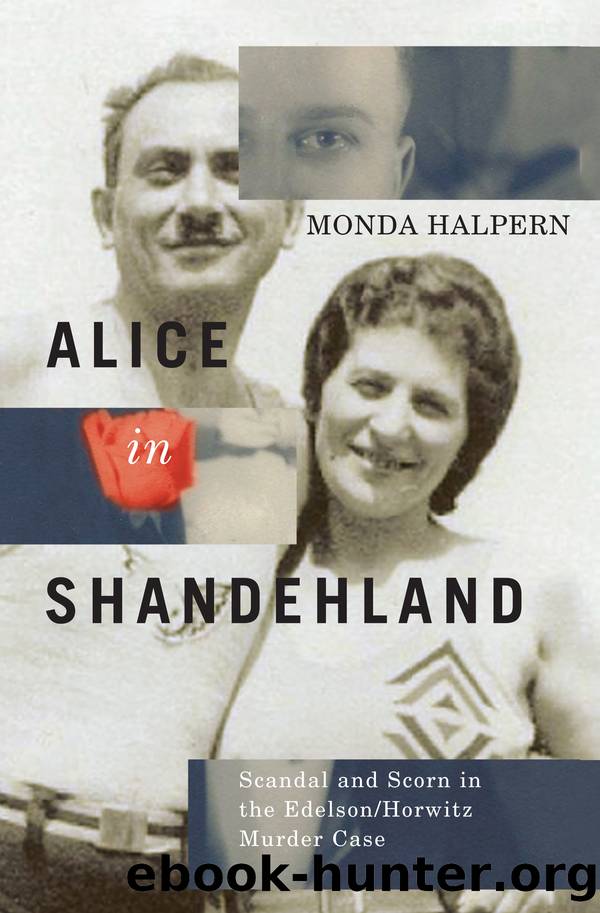Alice in Shandehland by Monda Halpern

Author:Monda Halpern
Language: eng
Format: epub
Publisher: McGill-Queen's University Press
Published: 2015-09-15T00:00:00+00:00
6
âA sudden silence fellâ: The Legacy of the Case
In Ottawaâs old Jewish cemetery, the Edelson and Horwitz plots, just steps apart, reveal both nothing and everything about the 1931 tragedy. Jack Horwitzâs headstone refers to him only as a âdear brother,â making no mention of his roles as a husband and a father. And neither his wife Yetta nor daughter Anita rests beside him. Beneath the impressive monument that marks the Edelson plot, Aliceâs modest stone declares her a âbeloved wife and mother.â Of course, no one expects an epitaph to reflect the intricacies of oneâs complex life on earth, but these words do more than render invisible the circumstances of 24 November 1931: many would say they distort and even mock them. These inscriptions, however, are just part of an enduring effort by the Edelson and Horwitz families to detract attention from the tragedy, and to uphold their good name. In the face of the media and gossiping frenzy that surrounded the Edelson/Horwitz murder case, a conspiracy of silence by the families and their lawyers existed almost from the very beginning. But despite everyoneâs best efforts to hush up the case, the Jewish community would surreptitiously discuss and remember it for decades, especially the unsavoury role of Alice Edelson.
Attempting to obscure a tragedy and even erase it from memory is not a strategy emblematic of the Jews. They are often dubbed a âpeople of memoryâ because of their adherence to commemorative holidays and rituals, and their cultural emphasis on both joyful and bleak historical milestones, such as the birth of the state of Israel and the Holocaust, respectively.1 In fact, much of the academic scholarship that proliferated in the 1990s around issues of memory related to Jews and the Holocaust.2 These studies often asserted that survivors, unlike many amnesiac victims of childhood maltreatment, for example, suffered from an âexcess of memory.â They felt compelled to share their stories (as the flood of survivor memoirs over the last five decades testifies), and to commemorate as a group their shared past.3
Studies of memory generally âgive central place to traumaâ as the experience âworth talking about â worth remembering,â but they necessarily identify the connected concept of âforgetting.â4 The past is a âtreacherous burden,â one which âwould crush usâ if forgetting did not allow us to âcontinuously divest ourselves of its weight.â5 Accordingly, in response to being âoverwhelmed by memories,â some Holocaust survivors demonstrated ânumbing, detachment, or suppression.â6 The dynamic of this process is complex. As Lawrence J. Kirmayer points out, âthe distinction between forget, repress, ignore and dissociate is not simply an arbitrary choice of metaphor. Each is a phenomenologically distinct form of not remembering.â7 For survivors of trauma, this ânot rememberingâ is mired in the fear of pain, reprisal, victim-hood, survival, remaining in the past, or burdening children.
In other words, forgetting is not necessarily a fortuitous act (nor a neurological lapse), but is âas much an active process as remembering.â8 Some authors have employed the term âintentional forgettingâ to indicate
Download
This site does not store any files on its server. We only index and link to content provided by other sites. Please contact the content providers to delete copyright contents if any and email us, we'll remove relevant links or contents immediately.
Cecilia; Or, Memoirs of an Heiress — Volume 1 by Fanny Burney(32538)
Cecilia; Or, Memoirs of an Heiress — Volume 2 by Fanny Burney(31934)
Cecilia; Or, Memoirs of an Heiress — Volume 3 by Fanny Burney(31925)
The Great Music City by Andrea Baker(31911)
We're Going to Need More Wine by Gabrielle Union(19030)
All the Missing Girls by Megan Miranda(15924)
Pimp by Iceberg Slim(14476)
Bombshells: Glamour Girls of a Lifetime by Sullivan Steve(14046)
For the Love of Europe by Rick Steves(13862)
Talking to Strangers by Malcolm Gladwell(13340)
Norse Mythology by Gaiman Neil(13332)
Fifty Shades Freed by E L James(13228)
Mindhunter: Inside the FBI's Elite Serial Crime Unit by John E. Douglas & Mark Olshaker(9312)
Crazy Rich Asians by Kevin Kwan(9271)
The Lost Art of Listening by Michael P. Nichols(7486)
Enlightenment Now: The Case for Reason, Science, Humanism, and Progress by Steven Pinker(7303)
The Four Agreements by Don Miguel Ruiz(6739)
Bad Blood by John Carreyrou(6608)
Weapons of Math Destruction by Cathy O'Neil(6260)
